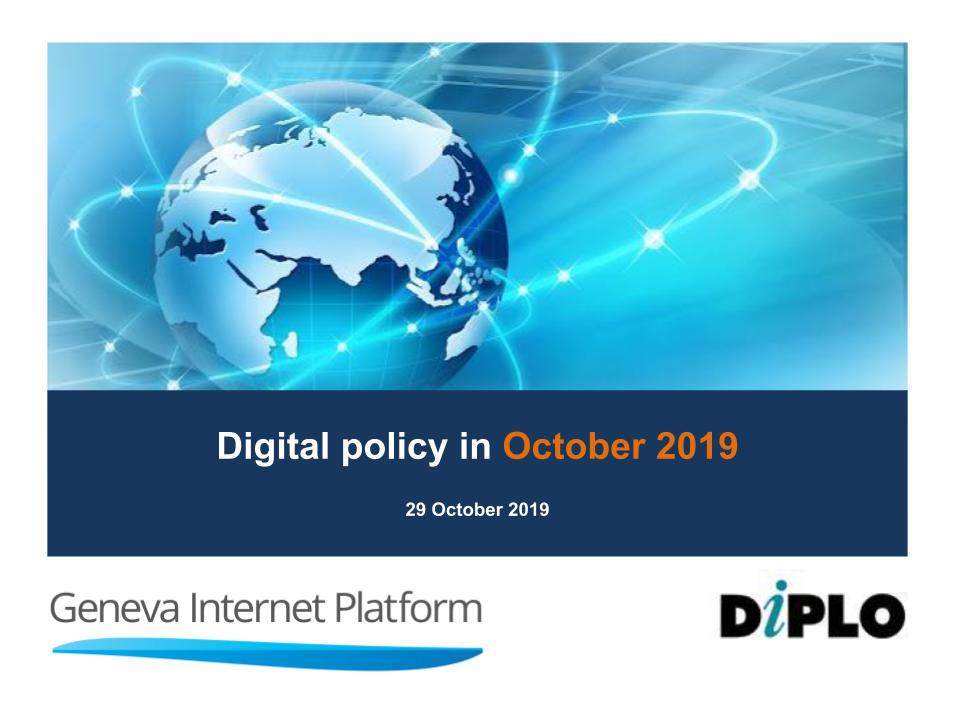
Renewed call from governments for back door access and new tools being used for surveillance; facial recognition technology (FRT) facing regulation; and Facebook’s Libra cryptocurrency project facing more scrutiny and setbacks were among the main digital policy trends in October 2019.
These and many other developments, trends, and regional updates were covered during October’s jus t-in-time briefing on Internet governance – our monthly appointment on the last Tuesday of every month – which took place on 29 October 2019. They will also be summarised in the Internet Governance Barometer for October and in Issue 43 of the Geneva Internet Platform (GIP) Digital Watch newsletter.
The briefing was led by DiploFoundation’s Digital Policy Senior Researcher Marília Maciel. She was joined by DiploFoundation’s Director of Cybersecurity and E-diplomacy Programmes Vladimir Radunović, DiploFoundation’s Multimedia Co-ordinator Arvin Kamberi, and DiploFoundation’s Senior lecturer, Researcher, and GIP Digital Watch curator Sorina Teleanu.
A look back to events in October
Maciel spoke about the major Internet governance events in October: the Global Forum on Cyber Expertise (GFCE) Annual Meeting 2019, World Trade Organization (WTO) Public Forum 2019 – from which the GIP rapporteurs provided reports, RIPE 79, World Intellectual Property Organization (WIPO) Conference 2019, European Telecommunications Standards Institute (ETSI) IoT Week, and the International Conference of Data Protection and Privacy Commissioners (ICDPPC).
Main developments in October

Maciel highlighted the Organisation for Economic Co-operation and Development (OECD) proposal for a new framework for taxing the digital economy. She also noted that the UN Special Rapporteur on the promotion and protection of the right to freedom of opinion and expression, urged governments and companies to protect vulnerable groups and targets of hate speech. The European Court of Justice ruled that Facebook can be ordered to delete content worldwide which has been deemed illegal in an EU country jurisdiction.
Main trends in October
- Renewed call from governments for back door access and new tools are being used for surveillance, Radunović explained. The USA, UK, and Australia have asked Facebook to pause it’s ‘Privacy First’ plans for end-to-end encryption. Emerging technologies, such as biometrics, smart cards, algorithms, and artificial intelligence (AI) are being used for surveillance, as reported by the UN Special Rapporteur on Extreme Poverty and Human Rights’ and the Carnegie Endowment for International Peace.
- Facial recognition technology (FRT) faces regulation, Teleanu noted. The use of FRT is expanding, such as in France and Singapore; but so are new laws and court cases banning FRT, with cases in the USA and Russia. On the other hand, the Swedish Data Protection Authority (DPA) allowed law enforcement agencies to use FRT to help identify criminal suspects.
- Facebook’s Libra cryptocurrency project faces more scrutiny and setbacks, Kamberi detailed. Facebook CEO Mark Zuckerberg testified before the US Congress about future plans related to Libra. PayPal, Mastercard, Visa, eBay, Stripe, Mercado Pago withdrew from the project. However, despite setbacks, the Libra Association launched the Libra Association Council.
Upcoming events in November
Maciel outlined the upcoming Internet governance events in November, including ICANN 66, deadline for comments on OECD’s new tax proposal, the 2nd OECD Global Forum on Digital Security for Prosperity, E-Waste World Conference, UN Forum on Business and Human Rights 2019, and the Internet Governance Forum (IGF) 2019.
Updates from GIP & DiploFoundation
The next issue of the Digital Watch newsletter will be published in the beginning of November. DiploFoundation will organise a webinar entitled ‘Applicability of international law to cyberspace: Do we know the rules of the road?’ with the support of Microsoft.
Regional perspectives
Amrita Choudhury gave updates from Asia about data protection of children coming into effect in China; Sri Lanka introducing the final draft of their Data Protection Bill; Singapore’s fake news law taking effect; the Australian National University releasing an incident report of the data breach they suffered in late 2018; the Australian Cyber Security Center publishing a ‘Small Business Cyber Security Guide’; facial recognition being made mandatory in China for telecom and Internet access; and the sixth World Internet Conference being held in Wuzhen.
Grace Mutung’u provided updates from Africa, including how African countries ranked on the Affordability Report 2019 and Ethiopia opening a national consultation on new telecommunications licences.
Andre Edwards provided updates from the Caribbean, where the Eastern Caribbean Central Bank launched a pilot digital version of the EC Dollar and Bermuda started accepting the stablecoin ‘USDC’ for tax payments.
Noha Fathy highlighted developments from the Middle East and North Africa, which included an Internet shutdown in Iraq amid protests and a reported Internet blackout in Syria.

[Briefings] Internet governance in October 2019


